Israeli blockade on Gaza means parents are separated from critically ill children
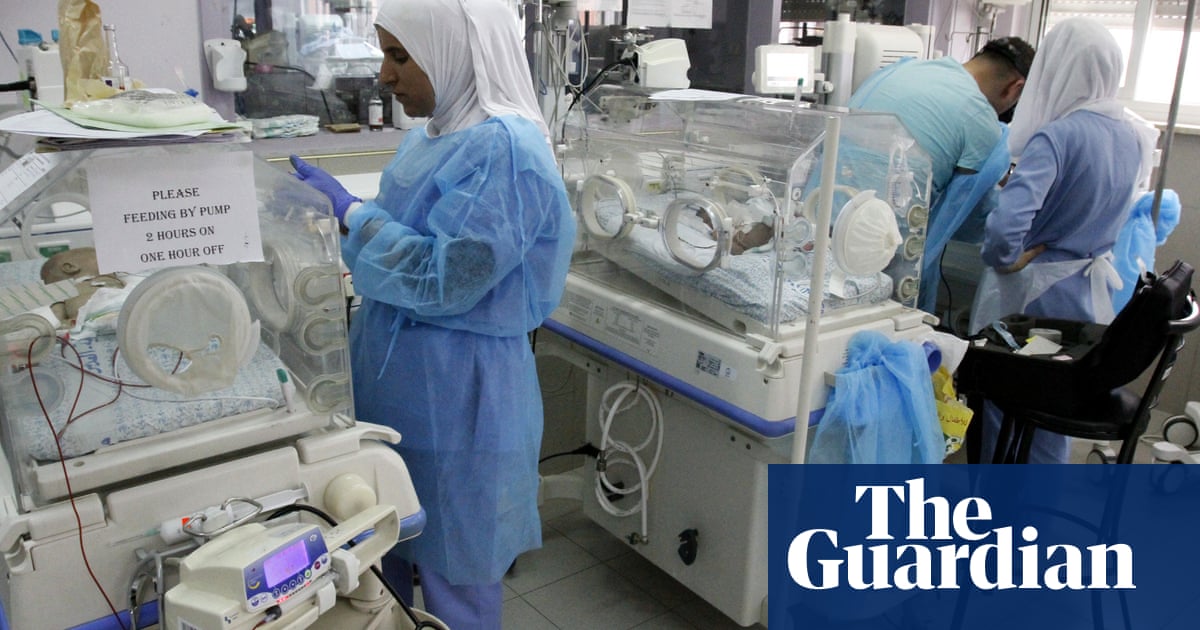
At first glance, nothing appeared out of place at the childrens intensive care unit. Nine beds were filled with nine tiny newborn babies, all with tubes attached to their wiry bodies. Monitors emitted the sounds of steady electronic blips. Nurses walked from bedside to bedside. A tired-looking paediatrician filled out paperwork.
Yet something was missing: there were no parents.
Some had been sent home to rest, or might be anxiously drinking coffee in the cafeteria downstairs. But for two babies at this Palestinian hospital in Jerusalem, their mothers were trapped an hour and a half away behind an Israeli-enforced blockade in Gaza. Both infants would later die, one without seeing her mother again.
Critically ill Palestinian infants taken from impoverished and war-battered Gaza to the better equipped Makassed hospital are suffering and dying alone.
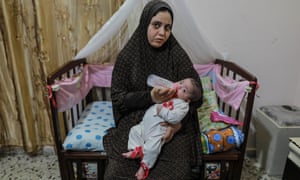
Israel allows temporary exit from Gaza for medical reasons in some cases, but not all. At the same time, it prevents or seriously delays many parents of patients from leaving, and others never apply in the first place, fearing that extensive security checks for adults will hold up their childs exit permit and lose vital time.
Since the beginning of last year, 56 babies from Gaza were separated from their mothers and fathers, six of whom perished without a parent present, according to the hospital.
In one case, a 24-year-old mother from Gaza was permitted to travel to Jerusalem to give birth to gravely ill triplets two months early. Two weighed less than a bag of sugar.
But Hiba Swailams permit expired and she had to return to Gaza. She was not there when her first child died at nine days old, or two weeks later when her second baby also died. She was informed by phone.
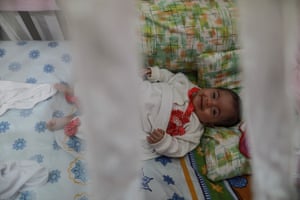
The surviving child, Shahad, spent the first months of her life cared for by nurses, and Hiba could only see her daughter in video calls. While the baby was ready for discharge since February, no family member was able to pick her up.
After being approached for comment, Israeli authorities allowed Swailam to exit Gaza. She was permitted to travel to Jerusalem the same day Israel responded to the Guardians request for commenton 29 May.
Physicians for Human Rights-Israel, an Israeli medical non-profit, said more than 7,000 permits were issued for minors from Gaza last year. Less than 2,000 permits for parents were granted, suggesting most children travelled without their mothers and fathers. Mor Efrat, the groups director for the occupied Palestinian territories, said the Israeli government should be held accountable for the human suffering.
Separating sick infants from their parents can have devastating impacts. Doctors believed one of the triplets who died when their mother was in Gaza had a condition for which one of the best preventative steps is breastfeeding. I wouldnt say that if the mother was there, they wouldnt get it, but it would decrease the chances, said Hatem Khammash, the head of the neonatal unit.
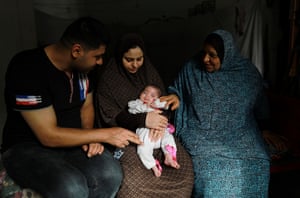
Ibtisam Risiq, the serving staff nurse in charge at the paediatric intensive care unit, has observed a psychological effect of newborns who are alone in her care. They need love. Their heart rates go up. They are depressed, she said.
Sitting at her desk, stacks of paper everywhere, she watched on as her nurses rushed to keep babies alive. She scolded them for leaving discarded medical wrappings on the floor. A large computer screen behind her showed the heart rates of each of the patients. As she talked, one jumped to 200 beats per minute. It should be 130, she said, and quickly dispatched a nurse.
Doctors walked in and out. Risiq picked up the phone to argue with an administrator who had called because another child was in need of urgent care. They asked in vain if any of Risiqs patients were stable enough to move to a lower-risk unit.
Were are at 100% occupancy, said Risiq. This happens every day. I face this every day.
Already struggling with finances, Makassed has faltered since Donald Trump cut millions last yearin medical aid to it and other hospitals that serve Palestinians in East Jerusalem.
A vicious political rivalry between the Palestinian political factions in the West Bank and Gaza has also deepened a health crisis. The West Bank-based Palestinian Authority (PA), the only group Israel will liaise with, has been accused of cutting medical aid to Gaza to press Hamas to cede control of the strip a charge the PA denies.
Saleh al-Ziq, the head of the PA office for Gaza that forwards exit permit applications to Israel, said it advised that sick children only be accompanied by people over 45, whose permits were usually processed more quickly by Israeli authorities as they were deemed to be less of a risk.
The result is that rather than parents, who are usually younger, Makassed is full of grandparents. The hospital has to cover their accommodation and food, and has set up trailers for them to sleep in. But in some cases, they too have to return to Gaza and the babies are left completely alone.
At the paediatric ICU, Risiq picked up a large green book filled with her scribbled records of admittances, many of them premature babies.
One newborn, Reema Abu Eita, came with her grandmother from Gaza for emergency spinal cord surgery. It was delayed as she had an infection, said Risiq, looking down at the baby, her eyes closed and chest pumping. Abu Eitas father, an ambulance driver, managed to get a permit to visit his daughter, but the baby died before returning to Gaza.
Another newborn from Gaza, Khalil Shurrab, came with an enlarged liver. Yellow with jaundice, he had been suffering convulsions.
Khalils grandmother accompanied him, according to his father, who spoke from Gaza. The hospital staff taught her how to send me and my wife photos of him on WhatsApp, said Jihad Shurrab, 29.
His wife, Amal, said she had stopped sleeping after her son left. I wish I could have gone with him to Jerusalem. I was begging everybody, but they said I am young and the Israeli side wouldnt accept.
To the families relief, Makassed eventually discharged Khalil after a month, and the baby could return back to Gaza. But when he did, they found the medication was locally unavailable. The swelling was increasing, his father said. He decided to try to leave Gaza to the south via Egypt, which also imposes a blockade but allows travel in certain cases. The day we were supposed to travel, he died.
Israel says its land, air and sea blockade on Gaza is to prevent Hamas and other militant groups from launching attacks. The UN calls it collective punishment for the 2 million people trapped there. Residents call it a siege.
Cogat, the defence ministry body responsible for coordinating Israeli government activity in the Palestinian territories, said in a written response that it had no age limits for permits and every request was examined individually.
Regarding the case of the triplets, it said a human error in the application forms meant one request filed by the mother in April had been rejected.
It blamed the health crisis in Gaza on Hamas and the PA, which it said massively reduced its medical aid budget for residents of the Gaza Strip. Hamas had used patients as mules to smuggle explosives and terror funds into Israel, it said.
Cogat is active in the issuance of tens of thousands of permits for patients as well as in the issuance of permits for Palestinian physicians, who receive training at hospitals in Israel, it added.
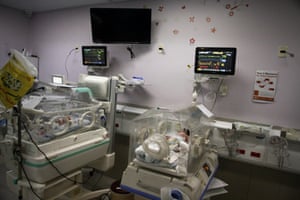
While it is harder for people in Gaza to exit, Makassed also serves the West Bank, and Palestinian parents there also find it difficult, sometimes impossible, to get to the hospital. Israel claims sovereignty over all of Jerusalem and has isolated even its majority Arab neighbourhoods from the rest of the Palestinian territories. Some patients, many older children with cancer, have families who live just minutes away but cannot visit.
The separation of children from their families is so common that Palestinian hospitals in Jerusalem provide tablets for them to make Skype calls.
A UK-based health charity, Medical Aid for Palestinians, has been giving British MPs tours of Makassed hospital to show them the results of separating children from their parents.
One Labour MP who visited said she has been pressing the UK government to intervene. Rosena Allin-Khan, who used to work as an emergency doctor, said: No child, anywhere in the world, should be alone in their time of greatest need.
The UK government must lean on Israeli authorities to overhaul this inhumane system.


Recent Comments